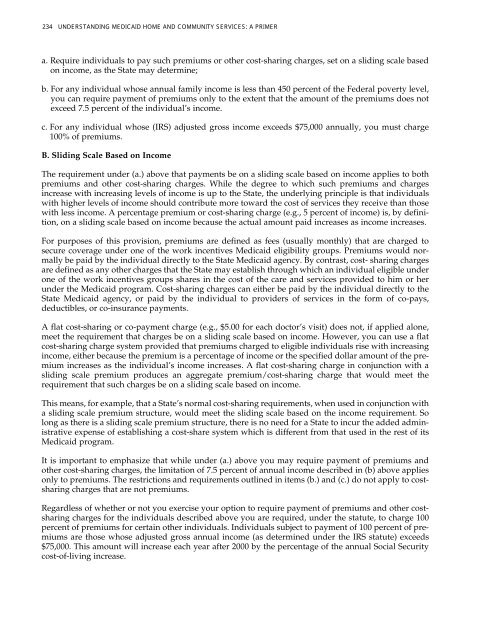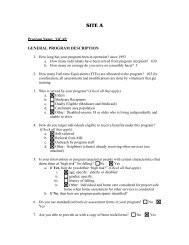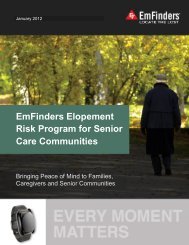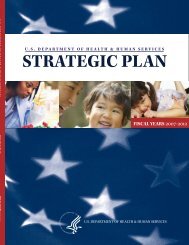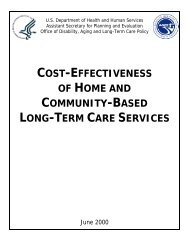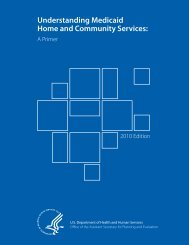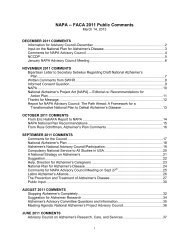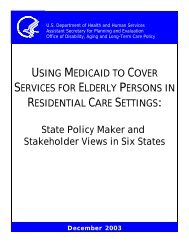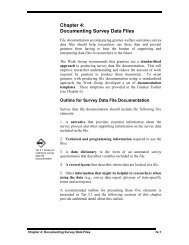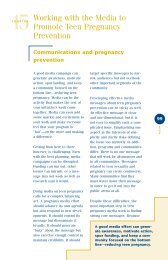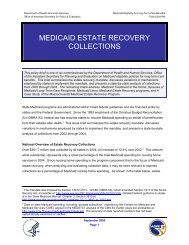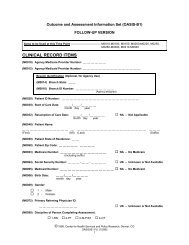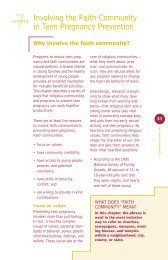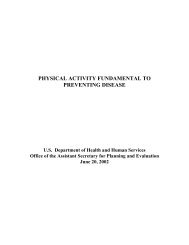Full PDF Version - ASPE - U.S. Department of Health and Human ...
Full PDF Version - ASPE - U.S. Department of Health and Human ...
Full PDF Version - ASPE - U.S. Department of Health and Human ...
- No tags were found...
Create successful ePaper yourself
Turn your PDF publications into a flip-book with our unique Google optimized e-Paper software.
234 UNDERSTANDING MEDICAID HOME AND COMMUNITY SERVICES: A PRIMERa. Require individuals to pay such premiums or other cost-sharing charges, set on a sliding scale basedon income, as the State may determine;b. For any individual whose annual family income is less than 450 percent <strong>of</strong> the Federal poverty level,you can require payment <strong>of</strong> premiums only to the extent that the amount <strong>of</strong> the premiums does notexceed 7.5 percent <strong>of</strong> the individual’s income.c. For any individual whose (IRS) adjusted gross income exceeds $75,000 annually, you must charge100% <strong>of</strong> premiums.B. Sliding Scale Based on IncomeThe requirement under (a.) above that payments be on a sliding scale based on income applies to bothpremiums <strong>and</strong> other cost-sharing charges. While the degree to which such premiums <strong>and</strong> chargesincrease with increasing levels <strong>of</strong> income is up to the State, the underlying principle is that individualswith higher levels <strong>of</strong> income should contribute more toward the cost <strong>of</strong> services they receive than thosewith less income. A percentage premium or cost-sharing charge (e.g., 5 percent <strong>of</strong> income) is, by definition,on a sliding scale based on income because the actual amount paid increases as income increases.For purposes <strong>of</strong> this provision, premiums are defined as fees (usually monthly) that are charged tosecure coverage under one <strong>of</strong> the work incentives Medicaid eligibility groups. Premiums would normallybe paid by the individual directly to the State Medicaid agency. By contrast, cost- sharing chargesare defined as any other charges that the State may establish through which an individual eligible underone <strong>of</strong> the work incentives groups shares in the cost <strong>of</strong> the care <strong>and</strong> services provided to him or herunder the Medicaid program. Cost-sharing charges can either be paid by the individual directly to theState Medicaid agency, or paid by the individual to providers <strong>of</strong> services in the form <strong>of</strong> co-pays,deductibles, or co-insurance payments.A flat cost-sharing or co-payment charge (e.g., $5.00 for each doctor’s visit) does not, if applied alone,meet the requirement that charges be on a sliding scale based on income. However, you can use a flatcost-sharing charge system provided that premiums charged to eligible individuals rise with increasingincome, either because the premium is a percentage <strong>of</strong> income or the specified dollar amount <strong>of</strong> the premiumincreases as the individual’s income increases. A flat cost-sharing charge in conjunction with asliding scale premium produces an aggregate premium/cost-sharing charge that would meet therequirement that such charges be on a sliding scale based on income.This means, for example, that a State’s normal cost-sharing requirements, when used in conjunction witha sliding scale premium structure, would meet the sliding scale based on the income requirement. Solong as there is a sliding scale premium structure, there is no need for a State to incur the added administrativeexpense <strong>of</strong> establishing a cost-share system which is different from that used in the rest <strong>of</strong> itsMedicaid program.It is important to emphasize that while under (a.) above you may require payment <strong>of</strong> premiums <strong>and</strong>other cost-sharing charges, the limitation <strong>of</strong> 7.5 percent <strong>of</strong> annual income described in (b) above appliesonly to premiums. The restrictions <strong>and</strong> requirements outlined in items (b.) <strong>and</strong> (c.) do not apply to costsharingcharges that are not premiums.Regardless <strong>of</strong> whether or not you exercise your option to require payment <strong>of</strong> premiums <strong>and</strong> other costsharingcharges for the individuals described above you are required, under the statute, to charge 100percent <strong>of</strong> premiums for certain other individuals. Individuals subject to payment <strong>of</strong> 100 percent <strong>of</strong> premiumsare those whose adjusted gross annual income (as determined under the IRS statute) exceeds$75,000. This amount will increase each year after 2000 by the percentage <strong>of</strong> the annual Social Securitycost-<strong>of</strong>-living increase.


